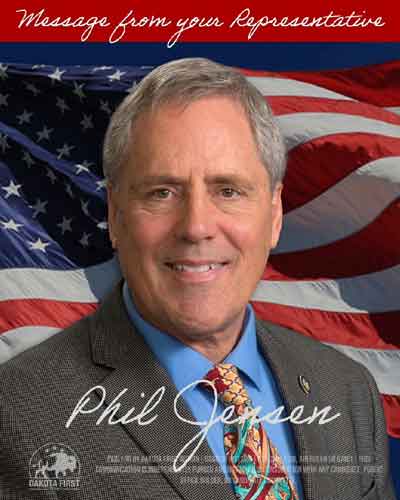Remember when lawmaker Phil Jensen was in the news for saying businesses should be able to refuse services to black customers?
A South Dakota Republican lawmaker believes that businesses have the right to refuse services to African-American customers because the free-market will shut out discriminatory practices, according to an interview with a local newspaper.
and..
In the state’s last legislative session, Jensen introduced a measure, Senate Bill 128, that would have protected employers from potential prosecution for turning away clients based on free speech. The measure proposes that businesses should reserve and enforce their rights to refuse services based on a customer’s sexual orientation.
“It’s a bill that protects the constitutional right to free association, the right to free speech and private property rights,” Jensen told the Journal.
Read that here.
And more recently, when he was removed as vice-chair of House Education because he wanted to defund the Huron School District to “send a message” over a tip he’d received..
A firestorm of criticism Wednesday forced a South Dakota lawmaker to lose a committee vice chairmanship and withdraw his bill to defund the Huron School District, which he filed in reaction to a tip about the district’s bathroom policy.
and..
The demoted legislator is Rep. Phil Jensen, a Republican from Rapid City. He filed a bill Tuesday to cut off state funding for the Huron schools — which are 300 miles from his own legislative district — with no reason given in the text of the legislation.
Backlash was immediate at the Capitol, where lawmakers are gathered for their annual legislative session. Reactions to the bill dominated morning conversations.
Read that here.
That’s just a smattering, but you get the point.
Why do I bring it up? Because, after dodging the draft, and asking that some doctors are able to be legally killed, Phil wants you to vote for Toby Doeden for Governor:

[redacted], you have a message from your State Rep, Phil Jensen:
——— 🇺🇸 ———
Southern Meade County, it is truly an honor to serve as your State Representative. I know you have a busy schedule, so I’ll keep this short:
Toby Doeden is a bold conservative Republican running for Governor of South Dakota. And on Thursday, he’s holding a town hall + meet and greet event in Piedmont. I’d love to see you and your family there.
The event will be held at the Elk Creek Resort & Lodge [xxxxxxxxxx I’m redacting this – pp xxxxxxxxxx ]. Free food and drinks will be provided.
I hope you can make it, but even if not, I wish you all the best and will continue fighting for you in Pierre!
Best Regards,
Rep. Phil Jensen
——— 🇺🇸 ———
Reply STOP to opt out. Paid for by Dakota First Action.
Once Phil has made an oath for Toby, you know he’ll keep it, since he’s also been a member of the far-right Oath Keeper Militia.
They say you’re known by the company you keep. And if this is the company Toby is keeping, he’d better buff up on his phrenology skills.
(You’d think after the whole Logan Manhart White-boy thing, this isn’t who Toby would send out as his next campaign representative)





